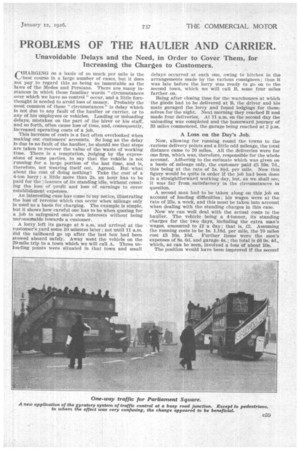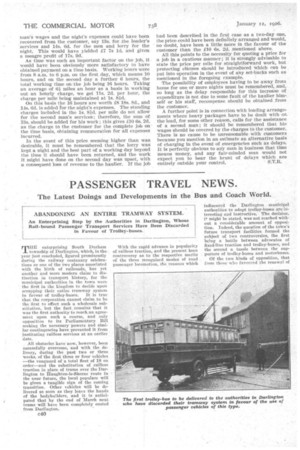PROBLEMS OF THE HAULIER AND CARRIER.
Page 23

Page 24

If you've noticed an error in this article please click here to report it so we can fix it.
Unavoidable Delays and the Need, in Order to Cover Them, for Increasing the Charges to Customers.
CHARGING on a basis of so much per mile is the Ibest course in a large number of eases, but it does not pay to regard this as being as immutable as the laws of the Modes and Persians. There are many instances in which those familial words "circumstances over which we have no control" occur, and a little forethought is needed to avoid loss of money. Probably the most common of these " circumstances " is delay which is not due to any fault of the haulier or carrier, or to any of his employees or vehicles. Loading or unloading delays, mistakes on the part of the hirer or his staff, and so forth, often cause loss of time, and, consequently, increased operating costs of a job.
This increase of costs is a fact often overlooked when making out customers' accounts. So long as the delay is due to no fault of the haulier, he should see that steps are taken to recover the value of the waste of working time. There is a temptation, Judging by the expressions of some parties, to say that the vehicle is not running for a large portion of the lost time, and is, therefore, not wearing itself out. Agreed. But what about the cost of doing nothing? Take the cost of a 4-ton lorry ; a little more than 2s. an hour has to be paid for the :leasure of its standing idle, without counting the loss of profit and loss of earnings to cover establishment expenses.
An interesting case has come to'my notice, illustrating the loss of revenue which can occur when mileage only Is used as a basis for charging. The example is simple, but it shows how careful one has to be when quoting for a job to safeguard one's own interests without being unreasonable towards a customer.
A lorry left its garage at 8 a.m. and arrived at the customer's yard some 10 minutes later ; not until 11 a.m. did the tailboard go up after the last box had been stowed aboard safely. Away went the vehicle on the 29-mile trip to a town which we will call A. Three unloading points were situated in that town and small delays oecurred at each one, owing to bitches in the arrangements made by the various consignees; thus it was late before the lorry was ready to go on to the second town, which we will call B, some four miles farther on.
Being after closing time for the warehouses at which the gOods had to be delivered at B, the driver and his mate garaged the lorry and found lodgings for themselves for the night. Next morning they reached B and made four deliveries. At 11 a.m. on the second day the unloading was completed and the homeward journey of 33 miles commenced, the garage being reached at 2 p.m.
A Loss on the Day's Job.
Now, allowing for running round the towns to the -various delivery points and a little odd mileage, the total distance came to 70 miles. All the deliveries were for one firm, which. was, therefore, responsible for the whole account. Adhering to the estimate which was given on a basis of mileage only, the customer paid £5 19s. 7d., this being at the rate of 1s. 8id. per mile. Now this figure would be quite in order if the job had been done in a straightforward working day, but, as we shall see, it was far from satisfactory in the circumstances in question.
A second man had to be taken along on this job on account of loading difficulties ; his wages were at the rate of 25s. a week, and this must be taken into account when dealing with the standing charges in this case.
Now we can well deal with the actual costs to the haulier. The vehicle being a 4-tonner, its standing charges for the two days, including the extra man's wages, amounted to £1 a day ; that is, £2. Assuming the running costs to be is. 1.18d. per mile, the 70 miles cost £3 16s. 10d. Further items were the men's expenses of 8s. 6d. and garage 4s. ; the total is £6 9s. 4d., which, as can be seen, involved a loss of about 10s.
The position would have been improved if the second man's wages and the night's expenses could have been recovered from the customer, say 13s. for the loader's services and 14s. 6d. for the men and lorry for the night. This would have yielded £7 is id. and given a meagre profit of 17s. 9d.
As time was such an important factor on the job, it would have been obviously more satisfactory to have obtained payment on a time basis. Working hours were from 8 a.m. to 6 p.m. on the first day, which means 10 hours, and on the second day a further 6 hours, the total working time on the job being 16 hours. Taking an average -of el miles an hour as a basis in working out an hoUrly charge, we get 11s. 2d. per hour, the charge per mile being maintained at is. Sid.
On this basis the 16 hours are worth £8 18s. 8d., and 14s. 6d. is added Tor the night's expenses. The standing charges included in the is. 81d. per mile do not allow for the second man's services; therefore, the sum of 33s. should be added for his work ; this gives 110 6s. 2d. as the .charge to the customer for the complete job on the time basis, obtaining remuneration for all expenses incurred.
In the event of this price seeming higher than was desirable, it must be remembered that the lorry was kept a night and the best part of a working day beyond the time it should have been returned, and the work it might have done on the second day was upset, with a consequent loss of revenue to the haulier. If the job had been described in the first case as a two-day one, the price could have been definitely arranged and would, no doubt, have been a little more in the favour of tile customer than the £10 6s. 2d. mentioned above.
All this points to the necessity for quoting a price for a job in a cautious manner ; it is strongly advisable to state the price per mile for straightforward work, but protecting clauses should be introduced which can be put into operation in the event of any set-backs such as mentioned in the foregoing example.
The possibility of employees having to be away from home for one or more nights must be remembered, and, so long as the delay responsible for this increase of expenditure is not due to some fault of the haulier himself or his staff, recompense should be obtained from the customer.
A further point is in connection with loading arrangements where heavy packages have to be dealt with on the load, for some other reason, calls for the assistance of a second man; it should be remembered that his wages should be covered by the charges to the customer. There is no cause to be unreasonable with customers because you mention in an estimate an alternative basis of charging in the event of emergencies such as delays. It is perfectly obvious to any man in business that time means money, and any fair-minded man would not expect you to bear the brunt of delays which are
entirely outside your control. S.T.R.
































